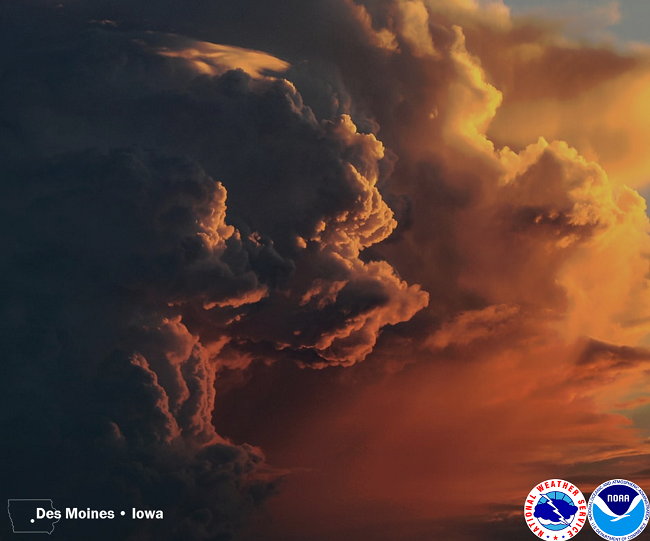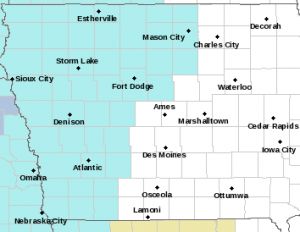
Today: Partly cloudy. High 68. W/NW @ 10-15 mph.
Tonight: Fair to P/Cldy. Low 35. Wind light & variable.
Tomorrow: P/Cldy. High 68. SW @ 10-20.
Thursday: Mostly cloudy. High around 45.
Friday: P/Cldy. High near 60.
Monday’s High in Atlantic was 68. Our Low was 19. Last year on this date the High in Atlantic was 38 and the Low was 22. The Record High on this date was 77 in 1992. The Record Low was -32 in 1962.
(Radio Iowa) – Iowans who want a crash course in severe weather can be a part of the storm spotter classes starting next month. Meteorologist Allen Curtis, at the National Weather Service in Johnston, says COVID-19 threw a wrench in their training efforts in recent years, but they’re getting back on track now. “We are actually reintroducing some of our in-person spotter training this year,” Curtis says, “but we will also be continuing to do a handful of virtual classes, for people who want to do that.” All sorts of people of all ages can sit in on the courses.
“Whether you have an interest in severe weather, a casual interest in weather, or even if you have a fear of weather and you just want to get more familiar with it,” Curtis says, “this is the kind of class we recommend to the public.” The classes include a multimedia presentation containing information about identifying and reporting severe weather, spotter safety, severe weather climatology in Iowa, thunderstorm structure and threats, and more. Students will learn about derechos, too. 
“We’re going to cover a number of things, ranging from recent severe weather — so if people remember December 15th, that’s a big one that we’ll cover,” Curtis says. “We’ll transition into things you can do to stay safe, individually, traveling with your family, things to look for in the sky, and things like how you can prepare at home, what items to have ready.” The courses run about an hour, they’re open to anyone and they’re free.
The first class will be held on March 15th in Adel, with more to follow in cities including: Hampton, Creston, Eldora, Corning, Fort Dodge and Grinnell, in addition to several virtual classes. Learn more at: www.weather.gov/dmx and click on the Storm Spotter link.
Today: Partly cloudy. High 62. W @ 10-15 mph.
Tonight: Fair to P/Cldy. Low 30. W @ 5 mph.
Tomorrow: P/Cldy. High 65. W/NW @ 10-15.
Wednesday: P/Cldy. High 65.
Thursday: P/Cldy to Cldy. High 47.
Sunday’s High in Atlantic was 57. Our Low was 11. Last year on this date the High in Atlantic was 36 and the Low was 20. The Record High on this date was 71 in 1972. The Record Low was -23 in 1962.
Today: Sunny, with a high near 51. Wind chill values as low as 10 early. Light west wind becoming west southwest 5 to 10 mph in the morning.
Tonight: Mostly clear, with a low around 22. South southwest wind around 6 mph becoming calm after midnight.
Monday: Mostly sunny, with a high near 58. Light west wind increasing to 5 to 10 mph in the morning.
Tuesday: Sunny, with a high near 63. Light west southwest wind becoming southwest 5 to 10 mph in the morning. Winds could gust as high as 20 mph.
Wednesday: Mostly sunny, with a high near 67.
Saturday’s High in Atlantic was 41. Our Low was 6. Last year on this date the High in Atlantic was 53 and the Low was 24. The Record High on this date was 71 in 2016. The Record Low was -16 in 1960.
Today: Areas of fog this morning; Mostly Sunny. High 38. SW @ 10-20.
Tonight: Fair to P/Cldy. Low 18. SW @ 5-10.
Tomorrow: P/Cldy. High 49. W/SW @ 10-15.
Monday: P/Cldy. High 52.
Tuesday: P/Cldy. High 56.
Friday’s High in Atlantic was 29. Our Low was -7. Last year on this date the High in Atlantic was 46 and the Low was 23. The Record High on this date was 72 in 1896. The Record Low was -28 in 1963.
Today: Partly-to Mostly Sunny. High 22. NW @ 10-15.
Tonight: Fair to P/Cldy. Low 5. Winds light & variable.
Tomorrow: Mo. Sunny. High 39. SW @ 10-20.
Sunday: P/Cldy. High around 50.
Monday: P/Cldy. High again around 50.
Thursday’s High in Atlantic was 22. Our Low this morning, -3. We received .3” snow Thursday, at KJAN, with a melted liquid value of just .01″. Last year on this date the High in Atlantic was 41 and the Low was 21. The Record High on this date was 70 in 1995. The Record Low was -12 in 2014.
Today: Mostly cloudy w/light snow (mainly this afternoon). High 18. NE @ 10. Wind Chill as low as -10.
Tonight: Light snow ending (1″ accumulation expected). Becoming Partly cloudy. Low 2. N @ 5-10. Wind Chill as low as -10.
Tomorrow: P/Cldy. High 22. NW @ 10-15. Wind Chill as low as -10.
Saturday: P/Cldy. High 39.
Sunday: P/Cldy. High 49.
Wednesday’s High in Atlantic was 20. Our Low was -3. Last year on this date, the High was 38 and the Low was 20. The Record High was 76 in 1930. The Record Low was -15 in 1894.
(Radio Iowa) – A new book from researchers at Iowa State University asserts that hotter weather brought on by climate change can make people more aggressive. Lead author Andreas Miles-Novelo, an I-S-U psychology graduate student, says decades of studies demonstrate how hotter temperatures alter the way people around the globe think and interact with each other. “We have lots of data that shows the hotter parts of the year, hotter years, hotter days of the year, hotter times, you find more reports of violent crime,” Miles-Novelo says, “so I suspect that will hold true. Whether or not it will be noticeable on any sort of level yet here in the United States, I’m not sure.”
In the book “Climate Change and Human Behavior,” the authors show how hotter weather and more frequent and severe weather events can influence individuals and groups, escalating political unrest, civil war and other forms of violence. The research finds people who are uncomfortably hot perceive others as behaving aggressively, which raises the odds of a hostile confrontation. Police officers are sworn to uphold the law but they’re still human and may be swayed by steamy weather. “There’s a really great study that I talk about in the book where they put cops in different training simulators and in one of the training simulators, they bumped up the temperature in the room,” Miles-Novelo says, ” and they found that the cops were more likely to shoot an innocent suspect than in the condition where the room was more of a comfortable temperature.”
It’s asserted that climate change brings more extreme and frequent droughts, wildfires, floods and hurricanes, and people everywhere will be at higher risk to fall victim to crime, hunger and poverty. Still, he says it appears too much hot weather can actually chill heated aggression levels. “For average temperatures, that’s going to be when it’s lowest,” Miles-Novelo says. “When it starts to get uncomfortably hot, then you start to see those aggressions tick up, but then there’s a certain point where it gets too hot, where you have to conserve so much energy and so many resources because of the threat of overheating that you’re not actually likely to go out and do something because you need to stay somewhere.”
The opposite is also true, he says, as aggression levels rise when it gets uncomfortably cold, but once it gets exceptionally frigid, the focus is on finding shelter. With hot weather and a worsening drought in the forecast, all is not lost. Miles-Novelo says proactively addressing challenges now could help to stave off some of the long-term troubles they predict for the future.
Today: Partly cloudy. High near 16. N @ 10-20. Wind chill values as low as -20.
Tonight: Partly cloudy, with a low around 2. NE @ 5-10. Wind chill values as low as -10.
Tomorrow: Mostly cloudy w/light snow. High 18.NE @ 10-15. Wind chill values as low as -10. New snow accumulation of around an inch possible.
Friday: P/Cldy. High 21.
Saturday: P/Cldy. High 37.
Tuesday’s High in Atlantic was 19. We received .1″ of snow/snow pellets Tuesday, which amounted to just a Trace of precipitation. Our Low this morning was -1. Last year on this date, the High was 51 and the Low was 24. The Record High was 65 in 2002. The Record Low was -22 in 1989. Sunrise is 7:04-a.m. Sunset is at 6:03-p.m.
A WIND CHILL ADVISORY REMAINS IN EFFECT UNTIL NOON TODAY for Monona-Harrison-Shelby-Pottawattamie-Mills-Montgomery-Fremont-Page Counties.
* WHAT…Very cold wind chills expected. Wind chills as low as 20 to 30 below zero.
* IMPACTS…The cold wind chills could cause frostbite on exposed skin in as little as 30 minutes or less. 
PRECAUTIONARY/PREPAREDNESS ACTIONS…
Use caution while traveling outside. Wear appropriate clothing, a hat, and gloves.